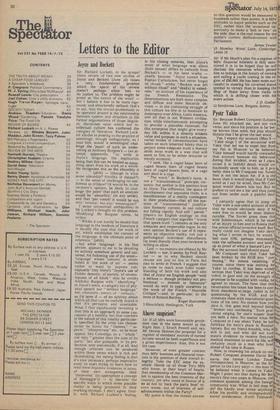Joyce and Beckett
Sir: Richard Luckett, in his sympa:* thetic review of two new studies of Joyce and Beckett (June 23) raises a very fundamental problem which the space of his review
doesn't perhaps allow him to do justice to. The problem might be
posed as the nature of the word —
but I believe it has to be more rigorously and structurally defined; that's
to say, that the crucial problematic to
be operated around is the relationship between system and structure in the formal organisations of those linguistic discourses upon which our intellectual culture has conferred the category of 'literature.' Richard Luckett alludes in passing to the practice of semiology, though ambiguously, as I read him, would 'a semiologist' challenge the 'point' of such an undertaking as Anthony Burgess's — (an attempt, apparently, " to write in Joyce's language, the implication being that this can be treated as something apart from his work as a whole. He recognises this as the absurdity it is . . (p8I(i) — (though in what sense absurdity? frivolity or despair?) — in the sense of challenging its usefulness as critique? Or would he, in the reviewer's opinion, be likely to challenge 'the point' that such an analysis would be ' absurdity,' (in any sense), and that 'par contre' it would be not. only ' rat iona I,' but aim) ' se ih iolog lea I?'
I sense unresolved ambiguities:in Mr Luckett's thought on this problem. 'Modifying' Mr Burgess' terms, he writes: " Whilst it can hardly be denied that language is the medium of literature it is equally the case that the work of art, which establishes the context of the language, is the ultimate point of reference." (p8 I (i).
—but while 'language,' in his first phrase, appears to me to be denoting an activity somehow generic and universal, his following use of the word— 'language' whose 'context' is established in 'the work of art' — seems rather to want to 'express conceptually' (my irony!) "Joyce's use of Dublin demotic, of parody, of onomatopoeia of all kinds" that he credits Anthony Burgess with " identifying " in Joyce's texts: a category not of physical speech nor " written language,"
but, ultimately. mercy if verba;ity," as I'd term if — of an activity about which all that can be usefully stated is that it's pervasive and unseizable. What I find significantly revealing is that this is an approach to some conception 9f a totality, but that nowhere is the nature of this totality particularly specified, So the critic can choose: either he hunts for " themes." " aspects," "idiosyncrasy" etc., or he must appeal, like Coleridge, to a " who le " not only " greater than the sum of its parts," but also graspable, in its production, only anecdotally, if at all. And though criticism can be produced within these terms which is rich and illuminating, my strong feeling is that it's now necessary, perhaps imperative even, to start trying to learn how to read these linguistic evidences in terms of their own strangeness, their ' throwness ' (to appropriate a concept of Heidegger's) — to discover the specific ways in which some possible reality is being projected in their working-through. I don't agree, finally, with Richard Luckett's feeling.
in his closing remarks, that Joyce's sense of what language was about (both senses) differs so radically from Beckett's — in his later works — chiefly because "Joyce turned from Roman Catholicism, but never forgot its rituals " whilst " Beckett was left without ritual" and "deal(s) in nakedness on account of his experience of
the French Resistance. The determinations are both more complex and diffuse and more blatantly obvious — in the continuing struggle of this culture we live in to maintain its dominance over Africa, Latin America, and all that is not Western civilisation, while simultaneously attempting to provide a plausible rationale, for this enterprise that might give everyday life within it a directly evident value and purpose; in such a situation, verbal modes of communication have taken on such inherited falsity that to project some adequate truth a literary artist must work in a way that will seem at first, to be either oracular or merely eccentric:
" I seek, like a caged beast born of caged beasts born of caged beasts born of caged beasts born, in a cage and dead in a cage.
" The word," in Beckett's texts, is not a " transcendental " principle, certainly, but neither is this position true to Joyce. The difference, the space of development that separates them, is a manifestation of a reality contingent in their production—that all the systems of " transcendental " justification formerly current, in our culture are falling rapidly. And still "parole " (there's no English analogy to this French category that signifies "words that speak truth ") remains as the only adequate and responsible logos. In my own opinion Beckett's use of it represents an objective reality, not just a pathological individual disturbance, far more literally than your reviewer is willing to allow.
Last — no reasons are offered by Mr Luckett — nor, it seems, by Prof. Kenner — as to why Beckett should choose not just to live in Paris but also to write in French. I suggest that in order to reach even fuller understanding of both his work and also that of Joyce we English people "with a serious — though probably not professional — interest in literature" would do well to apply ourselves to the work of the French " Nouvelle Critique"—and, in particular, to the texts of Roland Barthes.
Roger Hurcombe
5 Bleachfield, Heslington, York






























 Previous page
Previous page